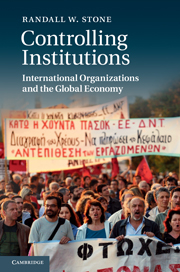Book contents
- Frontmatter
- Contents
- List of figures
- List of tables
- Preface
- List of abbreviations
- 1 Introduction: international organization and US power
- PART ONE THEORY
- PART TWO CASES
- PART THREE HYPOTHESES
- 7 Access to IMF resources
- 8 Conditionality under IMF programs
- 9 Enforcement
- 10 Conclusions
- Appendix: additional tables
- References
- Index
9 - Enforcement
Published online by Cambridge University Press: 11 April 2011
- Frontmatter
- Contents
- List of figures
- List of tables
- Preface
- List of abbreviations
- 1 Introduction: international organization and US power
- PART ONE THEORY
- PART TWO CASES
- PART THREE HYPOTHESES
- 7 Access to IMF resources
- 8 Conditionality under IMF programs
- 9 Enforcement
- 10 Conclusions
- Appendix: additional tables
- References
- Index
Summary
The IMF enforces the conditionality attached to its lending facilities by suspending disbursement of loan installments, or tranches, if borrowing countries fail to implement the associated conditions. The IMF Executive Board formally approves all disbursements of Fund resources. When a performance criterion is not implemented by its review date, this provokes an automatic suspension of the corresponding disbursement unless the board decides to issue a waiver or modify the conditions. According to staff, the requirement to seek Executive Board approval for changes to conditionality can constrain management's discretion and consequently reinforce its bargaining position with country authorities. However, management has discretion to recommend waivers or modifications to the board or to adjust the schedule of reviews and disbursements, and in practice its recommendations are not overruled. Because of the combination of management discretion and consensus decision making, it is easy for major shareholders to use their informal influence to urge management to propose waivers for favored client states. Since the status quo outcome is that the program is suspended until every performance criterion is met, shareholders' informal influence has the effect of relaxing the enforcement of conditionality.
Management's dilemma is as follows. After a program goes off track, it is generally optimal to modify it, because the original macroeconomic forecast is no longer valid and key performance indicators may no longer be achievable. Furthermore, even when a program goes off track because the government has made political decisions not to implement its conditions, it is optimal ex post to renegotiate in order to give the government incentives to modify its policies when the original set of targets is no longer realistic.
- Type
- Chapter
- Information
- Controlling InstitutionsInternational Organizations and the Global Economy, pp. 179 - 206Publisher: Cambridge University PressPrint publication year: 2011



